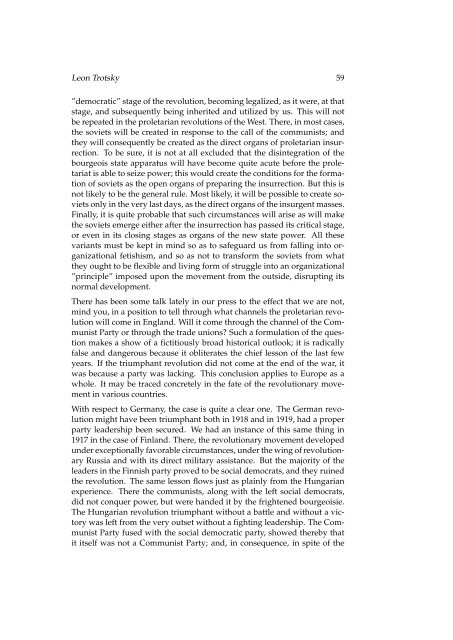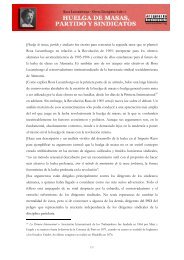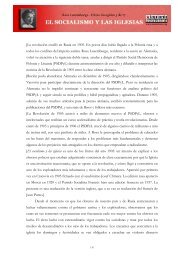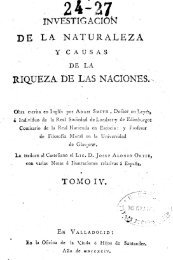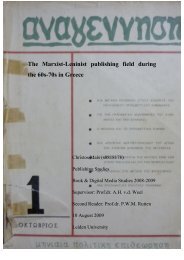Leon Trotsky, The Lessons of October - Platypus
Leon Trotsky, The Lessons of October - Platypus
Leon Trotsky, The Lessons of October - Platypus
You also want an ePaper? Increase the reach of your titles
YUMPU automatically turns print PDFs into web optimized ePapers that Google loves.
<strong>Leon</strong> <strong>Trotsky</strong> 59”democratic” stage <strong>of</strong> the revolution, becoming legalized, as it were, at thatstage, and subsequently being inherited and utilized by us. This will notbe repeated in the proletarian revolutions <strong>of</strong> the West. <strong>The</strong>re, in most cases,the soviets will be created in response to the call <strong>of</strong> the communists; andthey will consequently be created as the direct organs <strong>of</strong> proletarian insurrection.To be sure, it is not at all excluded that the disintegration <strong>of</strong> thebourgeois state apparatus will have become quite acute before the proletariatis able to seize power; this would create the conditions for the formation<strong>of</strong> soviets as the open organs <strong>of</strong> preparing the insurrection. But this isnot likely to be the general rule. Most likely, it will be possible to create sovietsonly in the very last days, as the direct organs <strong>of</strong> the insurgent masses.Finally, it is quite probable that such circumstances will arise as will makethe soviets emerge either after the insurrection has passed its critical stage,or even in its closing stages as organs <strong>of</strong> the new state power. All thesevariants must be kept in mind so as to safeguard us from falling into organizationalfetishism, and so as not to transform the soviets from whatthey ought to be flexible and living form <strong>of</strong> struggle into an organizational”principle” imposed upon the movement from the outside, disrupting itsnormal development.<strong>The</strong>re has been some talk lately in our press to the effect that we are not,mind you, in a position to tell through what channels the proletarian revolutionwill come in England. Will it come through the channel <strong>of</strong> the CommunistParty or through the trade unions? Such a formulation <strong>of</strong> the questionmakes a show <strong>of</strong> a fictitiously broad historical outlook; it is radicallyfalse and dangerous because it obliterates the chief lesson <strong>of</strong> the last fewyears. If the triumphant revolution did not come at the end <strong>of</strong> the war, itwas because a party was lacking. This conclusion applies to Europe as awhole. It may be traced concretely in the fate <strong>of</strong> the revolutionary movementin various countries.With respect to Germany, the case is quite a clear one. <strong>The</strong> German revolutionmight have been triumphant both in 1918 and in 1919, had a properparty leadership been secured. We had an instance <strong>of</strong> this same thing in1917 in the case <strong>of</strong> Finland. <strong>The</strong>re, the revolutionary movement developedunder exceptionally favorable circumstances, under the wing <strong>of</strong> revolutionaryRussia and with its direct military assistance. But the majority <strong>of</strong> theleaders in the Finnish party proved to be social democrats, and they ruinedthe revolution. <strong>The</strong> same lesson flows just as plainly from the Hungarianexperience. <strong>The</strong>re the communists, along with the left social democrats,did not conquer power, but were handed it by the frightened bourgeoisie.<strong>The</strong> Hungarian revolution triumphant without a battle and without a victorywas left from the very outset without a fighting leadership. <strong>The</strong> CommunistParty fused with the social democratic party, showed thereby thatit itself was not a Communist Party; and, in consequence, in spite <strong>of</strong> the


